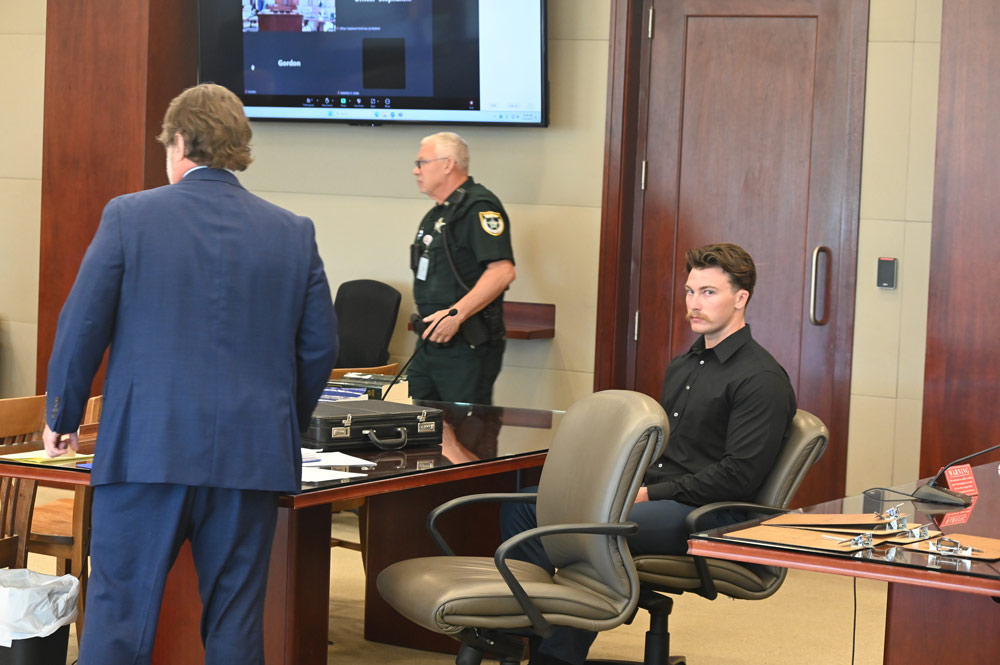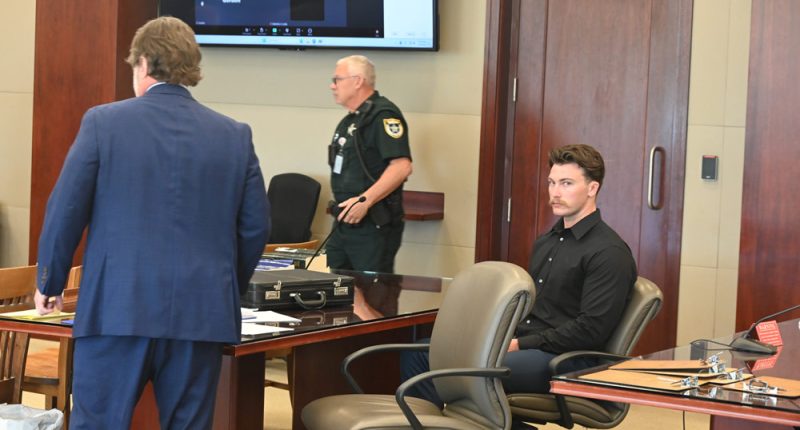
A week ago, 22-year-old Jayden Jackson’s attorney told the court that his client rejected a plea deal to serve four years in prison followed by a significant amount of probation for the hit-and-run death of Shaunta Cain in November 2022. Both the court and the prosecution warned Jackson that he could face a much stiffer prison sentence as a result.
Josh Davis, his attorney, disagreed. He could–and should–face less than that, he argued, and subsequently filed a memorandum of law to show how.
Today, Jackson pleaded to the crime, but with the understanding that while a lot has yet to be determined by the court, he could also end up being sentenced as a youthful offender (he committed the crime when he was 20). If the prosecution fails to prove that alcohol was involved in the crash, he could end up being sentenced to less than four years, and possibly to no prison time at all, but to a combination of house arrest and probation.
It was an open plea. That means it’ll be up to Circuit Judge Dawn Nichols, after she hears arguments from Assistant State Attorney Jason Lewis and from Davis at a sentencing hearing in late May. The date has not been set. Everything is on the table. Jackson could serve no time in prison. He could also serve 20 years in prison or more.
But today’s hearing was not without strong hints from the judge as to which way she’s leaning, and clear indications of what the prosecution and the defense will seek.
“I don’t see it as being a community-based sanction,” the judge told Davis, meaning that house arrest and probation alone is not likely. “I do think that YO would be an appropriate option. I do not see anything that indicated otherwise.”
YO is the acronym for youthful offender. Jackson was 20 when, driving home from a bar in Daytona Beach (according to the prosecution), his car swerved into the median on U.S. 1, not far from Plantation Bay, and struck and killed Cain. Instead of stopping and calling authorities, Jackson drove to his parents’ house in Daytona North.
The youthful offender determination is key for the defense. Without it, the law calls for a minimum mandatory sentence of four years in prison, and more than that if the judge deems it applicable. A youthful offender determination will not prevent a four-year prison sentence. But it allows the judge to go below it.
If the judge decides to sentence him as a youthful offender, his maximum exposure to any combination of penalty would be six years. In other words, he could get two years in prison, a year on house arrest and three years on probation, or one year in prison and five years on probation, and so on. If he were to violate his probation with technicalities (as opposed to a new crime), he could not be penalized outside that six-year window.
But if the prosecution shows that alcohol was involved, the judge’s sentence could be altered: as a 20 year old, Jackson was not supposed to be drinking–if he was drinking: Davis intends to show that he was not, just as Lewis intends to show that he was. Davis argued in his memorandum of law that “if the State had such poof” of intoxication, “the crime charged would have been DUI manslaughter.” It was not.
Case law is next to non-existent as far as who determines whether alcohol was involved or not–a judge or a jury. Lewis, Davis and Nichols spent a good part of today’s hearing trying to figure that out based on their research, which produced no precedents. So it’ll come down to the judge’s determination in May.
“It appears that I have an option,” Nichols said. “Then if anybody is upset with the ruling there is always the appellate court. That never offends me in any way. That’s what the appellate courts are there for. And to be honest with you, I do think there’s no case law from what the three of us could find. And if anybody finds anything else, let me know.”
But the judge also cautioned that the plea could go ahead “with the understanding that the court, after hearing everything, may not downward depart and may, in fact, sentence him to more, and his exposure is up to 30 years.”
In essence, Nichols will have to make a subjective judgment, based on the evidence presented by Lewis and, if any, by Davis, as to whether Jackson was drunk or not at the time of the crash, since law enforcement did not secure evidence showing that he was.
So Jackson tendered his plea, which means that he admitted to the crime, but only to the crime as charged: leaving the scene of an accident with death, a first degree felony. “If they’re pleading up to the court, then they’re admitting to all the facts,” Lewis said. “It’s either all or nothing.”
After the crash and after Jackson went home with the car–a dark gray 2017 Chevrolet 1500 pick-up that belonged to his father–his father, Flagler County Sheriff’s deputy Bryan Jackson, informed one of his commanders, who informed the Florida Highway Patrol, that the younger Jackson may have been involved in the crash. But since the Jacksons declined to give access to the car or provide breath samples, it took the investigators a while to secure the necessary warrants and carry out those parts of the investigation.
“The state believes, based on the circumstances of how the incident occurred, based on his driving pattern, based on the evidence,” Lewis said, “that we are going to try and prove that it was DUI related. They can make their argument that it wasn’t. We’ll make ours. But he has to understand that if you find that it was, then you couldn’t go below the four-year minimum–unless you decide that youthful offender applies. That, you still could. But all of this is all up to the discretion of the court, so it can go either way.”





